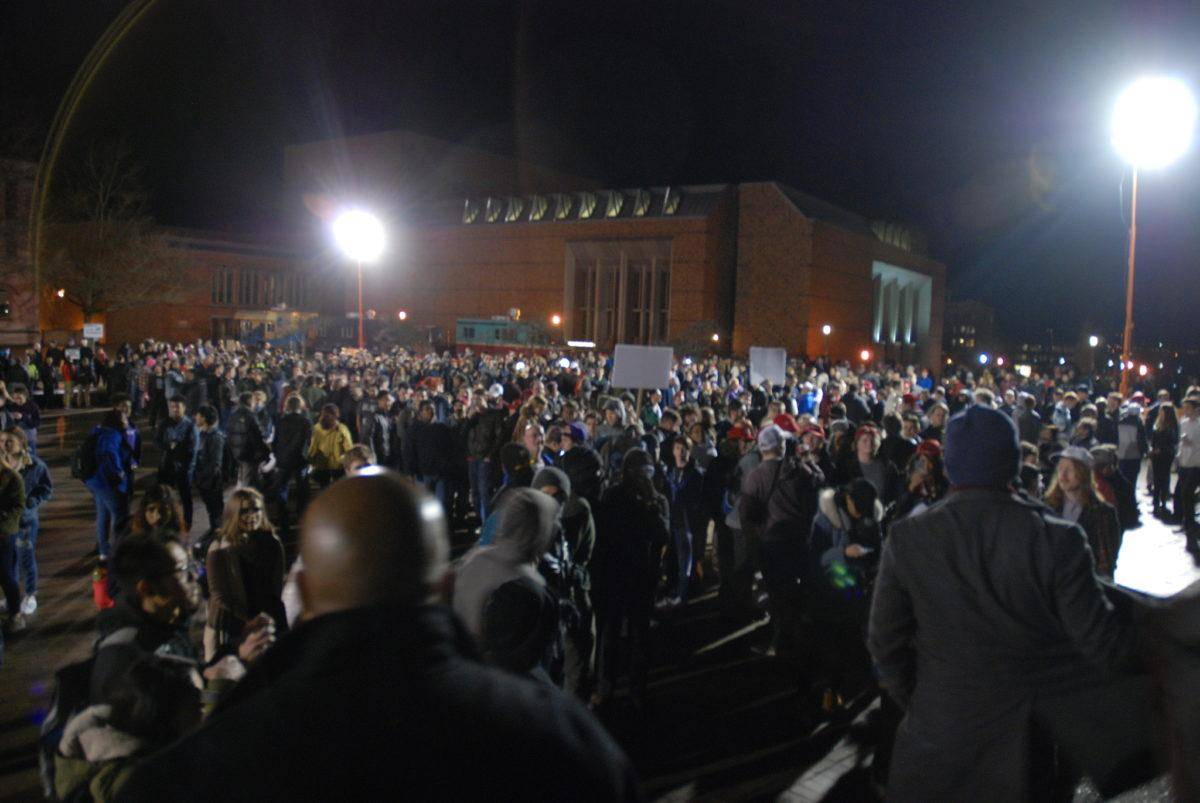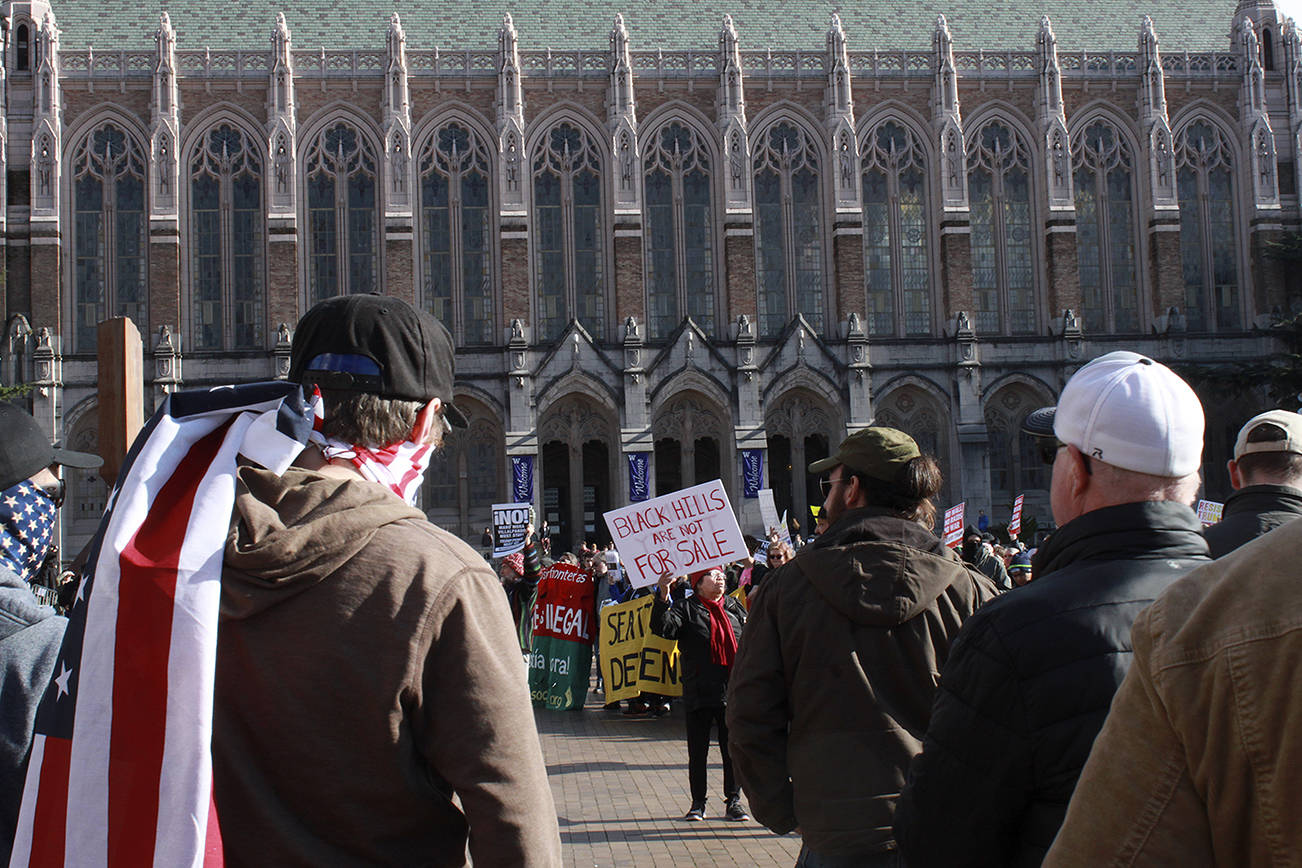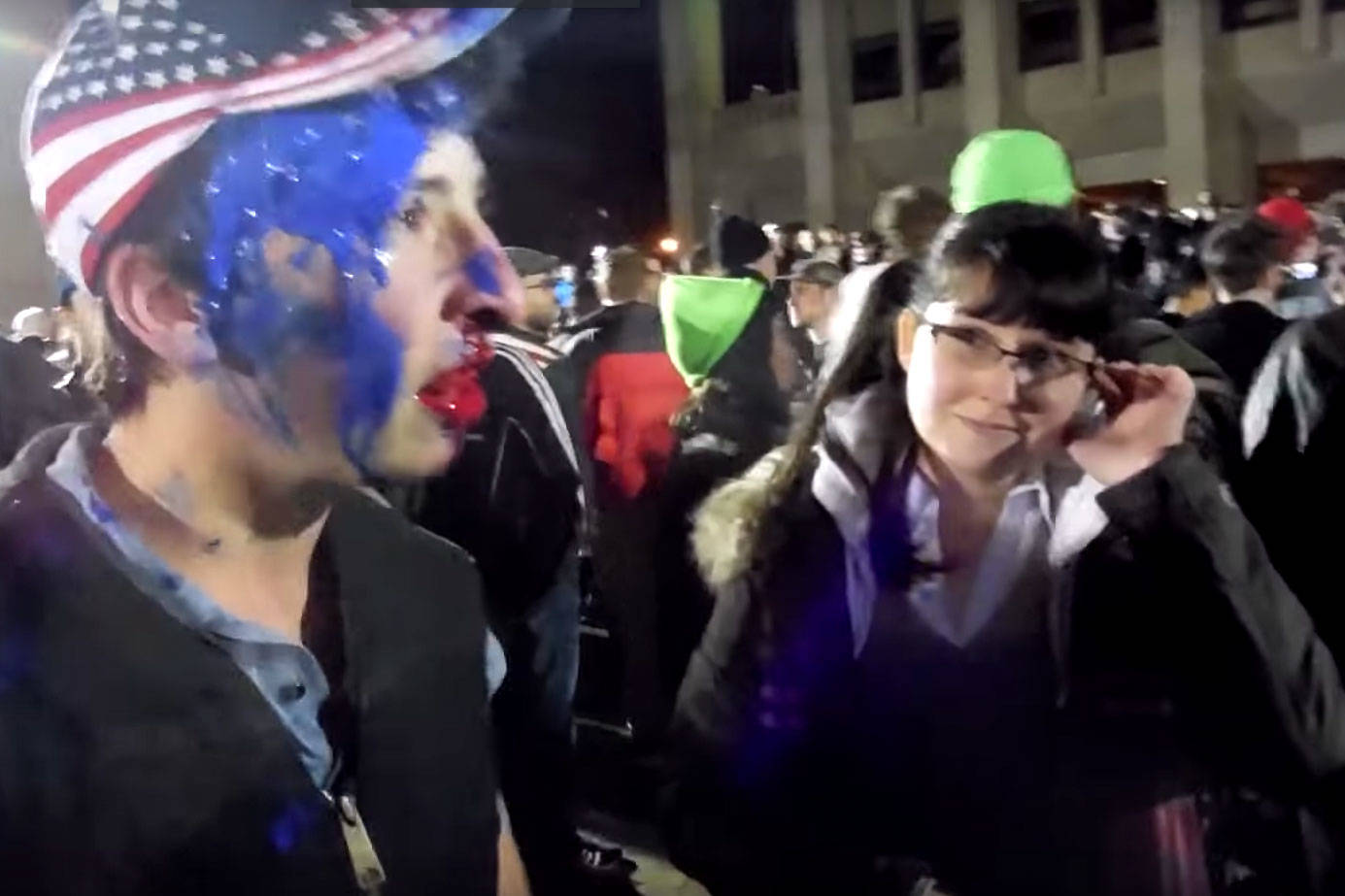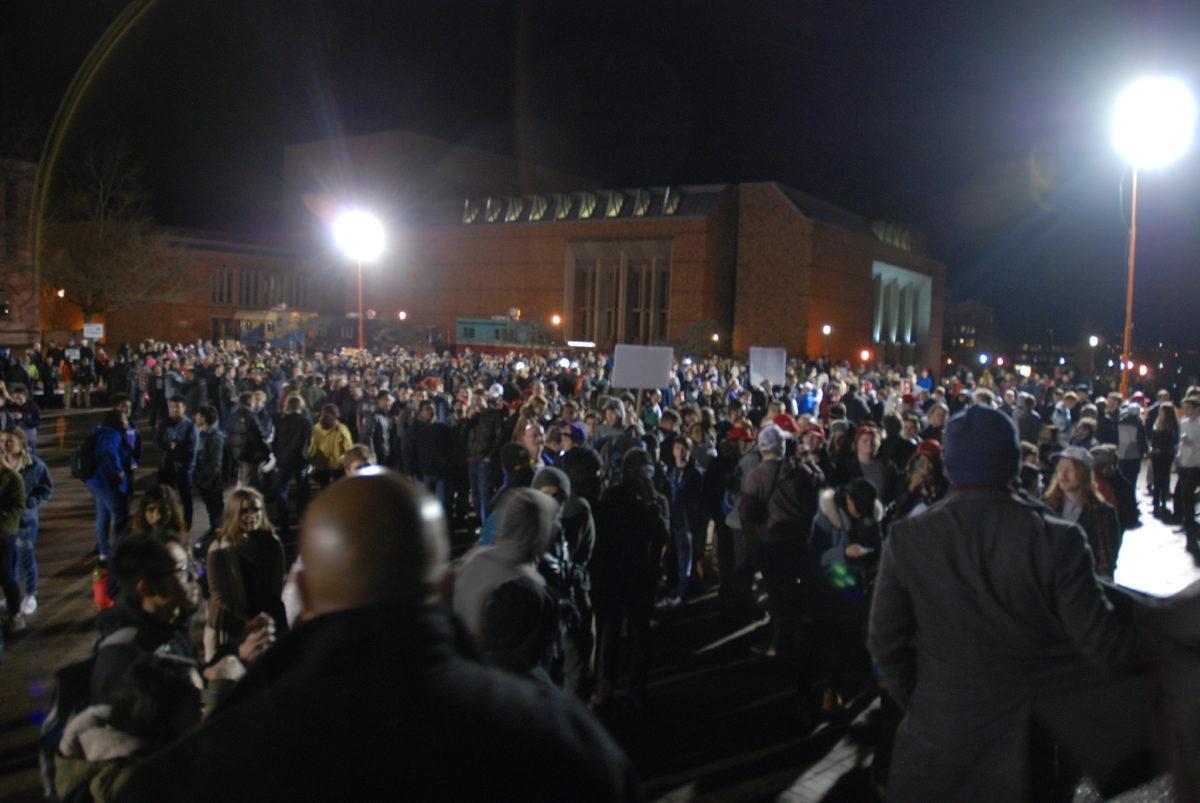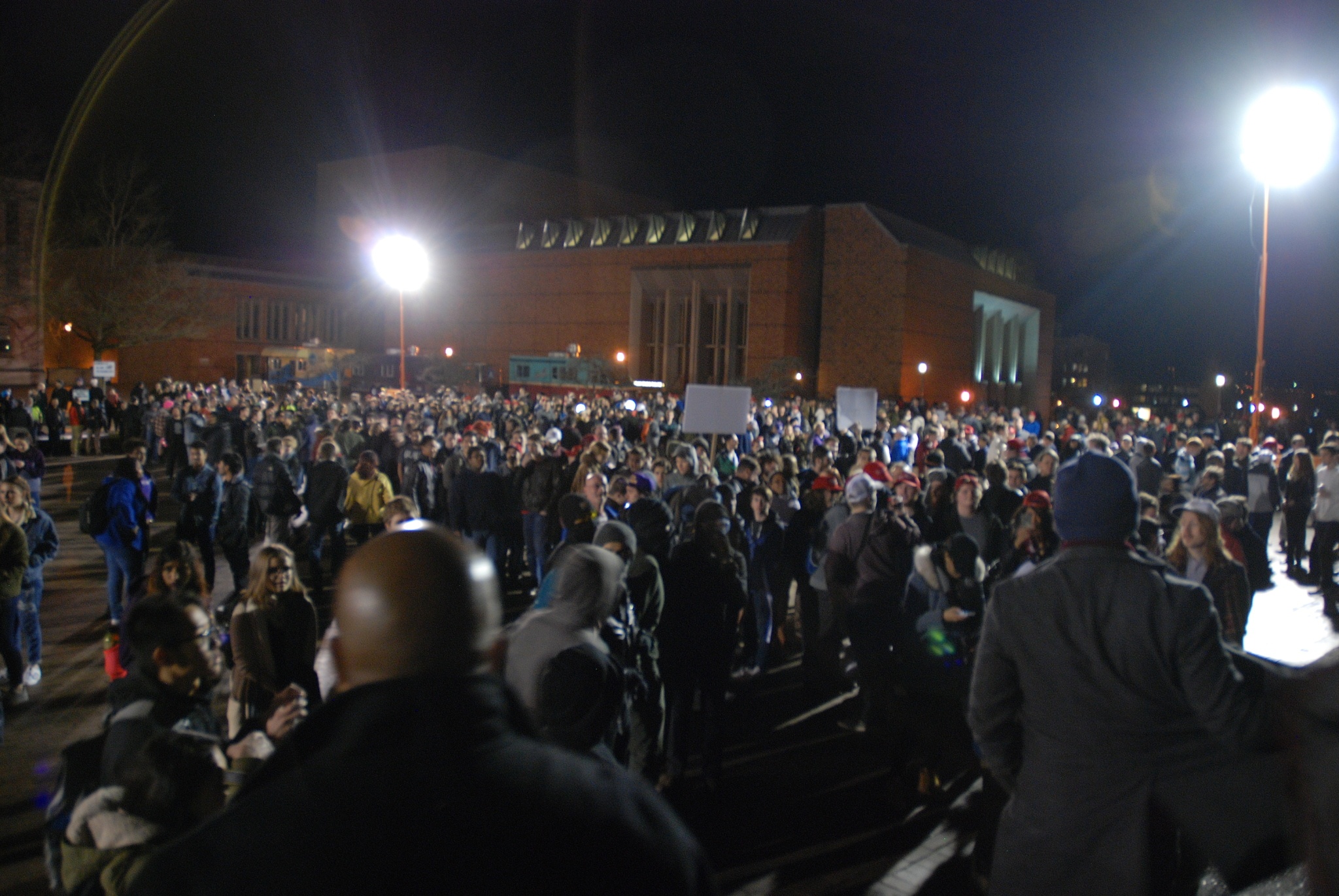“I’m gonna say something that a lot of folks won’t like,” says Joshua Dukes, the man who was shot on the University of Washington campus while protesting a speech given by alt-right icon Milo Yiannopoulos on Inauguration Day. “I don’t think Elizabeth [the shooter] should be permanently stripped of her gun rights.”
This is something Dukes’ lawyer didn’t release a statement on, but a matter Dukes himself wanted out in the public. If Elizabeth Hokoana is found guilty of first degree assault (a class A felony) as charged by the prosecuting attorney’s office, she will no longer be allowed to own a firearm (Marc Hokoana, who is charged with third degree assault, a class C felony, wouldn’t face the gun restriction.) The couple this week pleaded not guilty to the charges, saying that Elizabeth shot Dukes in order to defend Marc from physical harm. Prosecutors reject that claim, stating in charging documents that the couple went to the chaotic Jan. 20 protests looking for a fight.
Dukes has made it known that he wants to see a restorative justice process used in the case, rather than traditional prosecution, and his comments on the Hokoana’s gun rights underscore what he thinks the real problem is: A culmination of current events and bad ideologies, not a gun.
“I think [the Hokoanas] are dangerous people right now—I don’t want anyone to mistake my meaning,” Dukes says. “But the ideology is the scary thing. People can kill folks with lots of things. I’m worried about why they want to kill, not what they use to do so.”
The danger, he feels, is the alt-right’s ideology, something he describes as “white supremacy and toxic masculinity as a manifestation of individualism, especially within the context of neoliberalism.”
Dukes grew up in the small towns of Mill City, Ore., and Clearlake, Calif. The towns were predominantly Republican, predominantly white, and economically struggling. People limit themselves there, and it’s “horribly depressing,” Dukes says. He recalled plenty of alcoholism, physical violence, and drug abuse.
Dukes became aware of the narrow scope through which his town viewed the world by milling about on the Internet. Realizing more was out there, he moved away and thought he left the embittered sentiments of rural America behind.
“And then the election came, and I was like ‘oh, I’m back,’” Dukes says. “The thing that’s really PTSD is the Trump administration. The country got turned into what I was trying to escape.”
His first-hand experience with those who support Trump’s ideology, combined with the violence he experienced on Inauguration Day, suggests to him the U.S. is facing a reckoning.
“I think that solving this problem requires different solutions than we’re used to,” Dukes says. “It’s going to require all of us to look at ourselves and ask how we are participating in and perpetuating systems that drive this violence. All of us living in cities hold some level of responsibility for ignoring the hell that a lot of cultural communities have become as jobs have left and drugs have taken over.”
Dukes isn’t saying the struggle of blue-collar communities facing economic hardship is an excuse to legitimize racist sentiments or hatred, but that it helps contextualize America’s situation. And, he says, it explains why guns aren’t the problem.
“[Elizabeth] needs to be held accountable, but we also need to look in ourselves if we want to address the root of the problem and not a symptom,” Dukes says. “Their guns make the symptoms worse, but the root is deeper.”
Moreover, the criminal response to Elizabeth’s actions will only make matters worse. Felonies demand jail time, collect fines, restrict freedoms in the hopes that it will rehabilitate a person into society.
“A felony can keep her from getting a job,” Dukes says. “While I think that the person she is now needs to be held accountable, I don’t think that all the people she could become should be punished. We don’t know the ways in which she could change during her life, and a felony can’t account for that. I have friends who are still dealing with felony charges, even though they’re different people than when they were arrested.”
For all his open-mindedness, Dukes has seen himself and his friends become subject to worsening online harassment by alt-right supporters. These people frame themselves as defenders of free speech, Dukes says, when in fact their aim is the exact opposite.
“What that harassment is intended to do is to limit free speech, to limit people from speaking out,” Dukes says, specifically listing people of color and the LGBT community.
“This online harassment is part of a larger thing to silence people,” Dukes says. “Milo is a part of that. It is literally the inverse of what [point] the College Republicans are making.”
Dukes fears a large scale chilling effect on free speech. The more people get harassed, online and in real life, the more they have to battle over their right to simply exist. This can make them overwhelmed, get scared, or give up.
“So when people are there to say Black Lives Matter are terrorists, it’s these insane claims that direct violence,” Dukes says. “The name-calling, the use of violence, threats of death are to stop people from protesting. It’s the very definition of destroying free speech.”
In retrospect, Dukes questions if the broken legal system would’ve charged the Hokoanas had he been a masked member of black bloc, or if he wasn’t white.
“This was a test of Washington’s laws and what they can give you,” Dukes says. “Do we get to murder people and just say we were scared?” In this way, Dukes sees the charges against the Hokoanas as a necessary evil for the sake of precedent.
“There’s no way [the charge] isn’t bitter sweet,” Dukes says.
Still, he sees our punitive system as illegitimate and faulty. Pointing to the No New Youth Jail movement in Seattle, Dukes says that restorative justice is an idea that will have its day, even if it’s not carried out in the Hokoanas’ case. “For anybody who thinks restorative justice is good, there is a pathway to get there,” he says. “It may not be this time, but in the future. There are people working on that right now. There are people they can work with today to make that happen.”
news@seattleweekly.com
